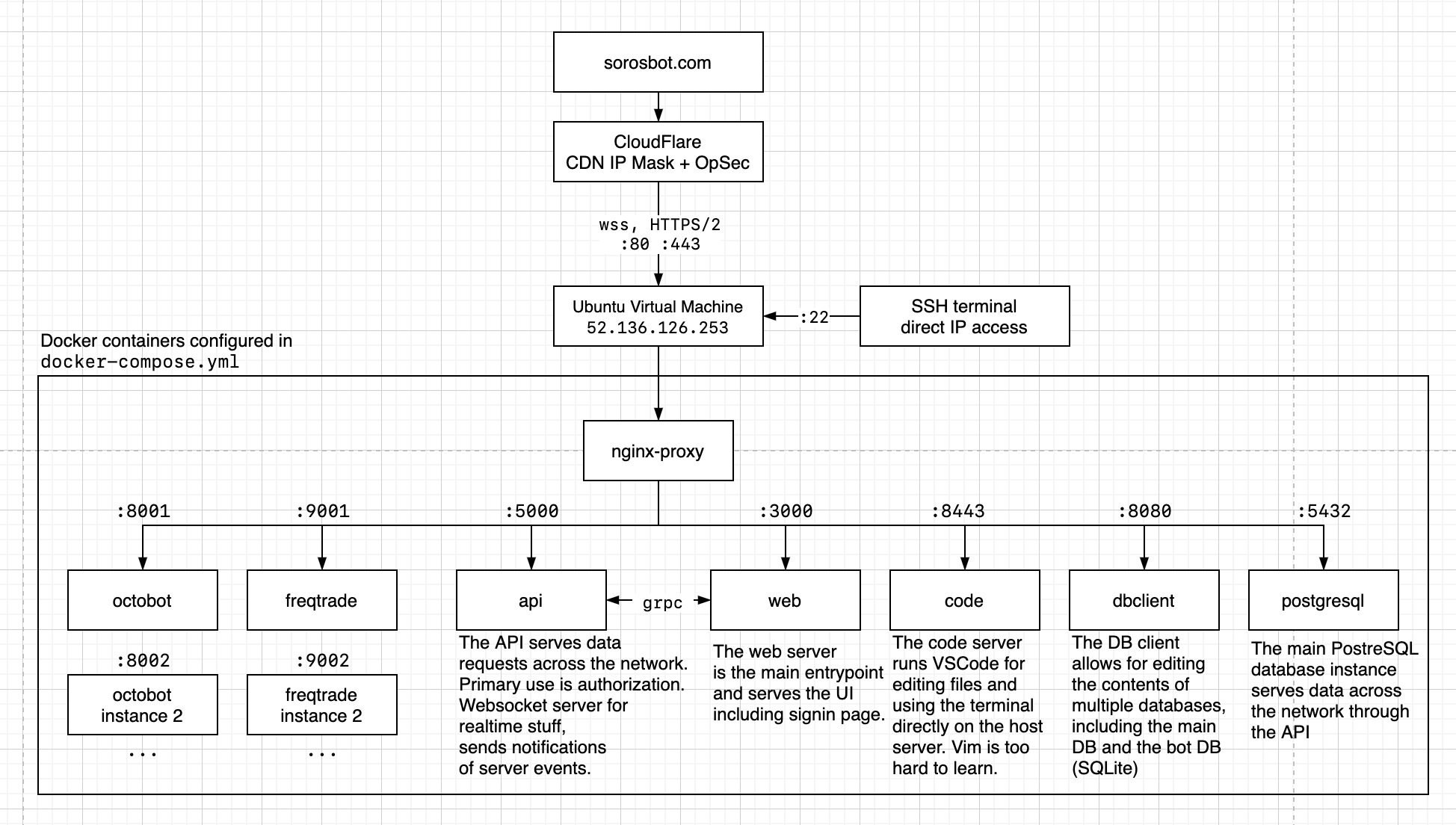Development tools
Strategies
TODOs
Terminal basics
High Frequency Trading bots exploit differences in asset value between markets, and within a market, as well as trade on a short term basis.
The bot should be easy to interface with, e.g. though a webpage or messaging app such as telegram. The list of supported markets should be the following:
- Bitmart — https://www.bitmart.com/
- Dex — https://dex.guru/
- Pancakeswap — https://pancakeswap.finance/
- Binance — https://binance.com/
- Nomics — https://nomics.com/
Freqtrade - https://www.freqtrade.io/en/stable/
Pros
- Battle tested open source with 5M+ docker pulls
- Supports: Binance, Bittrex, FTX, Kraken, Bitvavo
- Supports 120 other markets potentially though https://github.com/ccxt/ccxt/
- Lots of features Telegram integration Cons
- Existing implementation, high adoption rate
- Risk disclaimer
Adding Strategies - Step by step guide: https://github.com/freqtrade/freqtrade-strategies#how-to-install-a-strategy
Strategies - Detailed documentation: https://www.freqtrade.io/en/stable/strategy-customization/
Technical analysis involves using real-world data to try to predict the future of the market. It involves looking at past statistics of the cryptocurrencies in question, including factors like volume and movement.
evaluating the cryptocurrency’s inherent value - by patterns and analytic charting tools - determine strengths and weaknesses and then future patterns
Supported markets
- Bitmart — https://www.bitmart.com/ - loads of new altcoins/shitcoins
- Dex — https://dex.guru/ - dex
- Pancakeswap — https://pancakeswap.finance/ - dex
- Binance — https://binance.com/ - cheapest transaction fee
Octobot - https://www.octobot.online
Pros
- Supports: Binance, Bitmex, BitMax, coinbase, KuCoin, Bitfinex, Bittrex
- 120 other markets potentially though https://github.com/ccxt/ccxt/
- Features: arbitrage, social trading, technical analysis (TA), social media processing or even external statistics management like google trends
Cons
- Risk disclaimer
- Digital Ocean?
Whitelist and Blacklist target asset pairs to trade Fine-tune bot configuration parameters such as max_open_trades, stake_amount, etc. Backtesting - Backtesting is the process of using recorded data of cryptocurrency / stock markets injected in a system to test its performances on past data. Live trading with oversight in web interface and notification channels (email, telegram) Machine Learning models for classification and sentiment analysis Arbitrage trading: Intra market and in-market cryptocurrency triangle arbitrage
https://coinmarketcap.com/api/ Bot output data - SQLite for Freqtrade Web scaped NLP sentiment data, tagged for asset pairs, markets, products, domains, and generic semantic data
Automated approach to Content Publishing with bots to inflate the value of an asset momentarily, or to generate a price difference between markets for a given asset pair.
It is possible to register to any platform or service that offers a free tier using the following strategy:
- Buy a domain from Google Domains for $12
- Enable email aliases for *@newdomain.com: infinite verifiable email addresses
- Buy a phone number on Twilio or SignalWire from $1 to $20: infinite verifiable phone numbers Register to free service, if asked, use a prepaid Revolut temporary virtual card and it will not be charged once the service switched to a paid tier
- For legal identity verification, it’s possible to buy fake ID documents on the dark web ($$$) -> infinite verifiable identities
It is possible to use the OpenAI API to run ML models as a service. Possible use cases for applied Machine Learning in the crypto trading domain are: Reinforcement Learning and training ML models new models on the databases Create a new model architecture version to improve performance Applied NLP for sentiment analysis of posts, comments, articles and online content - Read more on OpenAI blog.
- Live training custom models using OpenAI Gym in an Nvidia Tesla M60 GPU accelerated environment in Azure
- Using time series data to predict future asset value with Reinforcement Learning while backtesting Recurrent LSTM models
